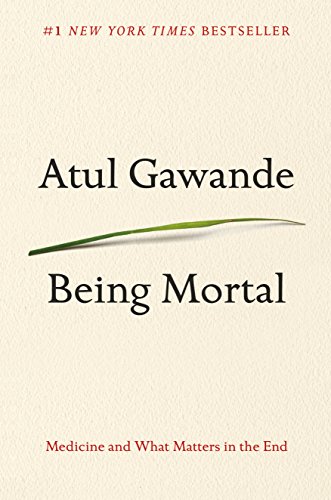Book Review: Being Mortal
Published:
Being Mortal by Atul Gawande is a heart-to-heart with American readers about end-of-life care. Sharing personal anecdotes and case studies, Gawande argues that the dying and their caretakers should aim to enrich, rather than merely prolong, life.

Here’s the paperback and audiobook.
Utility: ⭐⭐⭐⭐ (4/5)
The book is terrifying because every reader knows that it will eventually, in their lifetimes, become a how-to guide. Whether for friends, family, or myself, the knowledge provides useful frameworks and procedures for living life to the end. He is particularly adamant about showing empathy and having a frank discussion of priorities. It strikes anyone as obvious in retrospect—shouldn’t the patient’s values be at the center?
Writing: ⭐⭐⭐⭐ (4/5)
Upholding his title as a great physician-writer, Gawande made me cry several times in public. Unsurprising for a subject as intimate as the death of loved ones, but Gawande’s warm and wise voice is the perfect narrator. What struck me the most is his focus on the people. He takes his time to bring his patients to life and, in doing so, demonstrates how medical providers ought to care for their fellow mortals.
Notes
- The medical establishment is too intent on prolonging life, pushing patients towards grueling treatments and experimental drugs. A quick glance at the statistics would show that in many cases, death is near-inevitable. All of it causes needless waste and suffering.
- While some providers do have a financial incentive to push for more treatment, a deeper human urge is also at play. It is awkward and sad and difficult to tell a patient that they will die. In a room with the patient’s children, parents, or spouse, a physician faces tremendous pressure to stay positive.
- Doctors should try to be interpretive rather than merely informative. A patient can be overwhelmed by medical information. What they really need is help in making decisions that align with their values. This requires shared decision-making, where the doctor makes a genuine effort to elicit the patient’s needs.
- Don’t overlook hospice. Many patients decide to spend the rest of their lives in their homes with loved ones, rather than on a ventilator. Most of them are happy with their decision.
- New models of elderly care could be promising. Some involve filling a nursing home with life—children, dogs, cats, and birds. Others try to give the elderly as much independence and privacy as possible.
